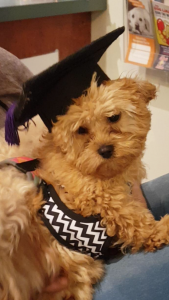PUPPY PRESCHOOL
Puppy preschool is great to attend as it helps you with your training, as well as providing vital socialisation for your puppy at the critical development age of 6-18 weeks. We run a 4 week course on Wednesday nights. It involves a pamper session with a professional groomer and a talk from a veterinarian. You receive extra information about health care, emergencies and nutrition.
At the end of the course your puppy gets to graduate and receive a bag of goodies. Fun is had by all who attend and it is great for your puppy to make friends.
During the course they learn important skills like:
- Walking on a lead
- Sit and stay
- Lay down
- Shake hands
- Come when called – which means knowing their name!
If interested, book in as places are limited! Most courses start at the beginning of each month.

TOILET TRAINING
Puppies may not develop full bladder control until 20 weeks of age, thus patience is required. At 7-8 weeks of age they develop a preference for their toileting surface, therefore take them to the surface you want them to use later. Puppies are most likely to want to toilet after waking, eating and playing. It is best to take them to the same spot at these times, and praise and reward them when toileting is done correctly. Never punish them or rub their noses in it as this can create negative memories. Most puppies stop urinating/defaecating if startled; therefore if you notice them starting to toilet inside, quickly pick them up and take them outside. Don't forget to reward them when they are finished.
Kittens usually take to litter trays easily. To reduce your chances of issues do the following:
- Pick the correct size. About 1.5 times the length of an adult cat is the minimum size.
- Put the litter tray somewhere accessible, but away from high traffic areas. Cats hate an audience.
- Place the litter tray away from the food and water bowls.
- Clean the litter tray daily; this is especially important for covered trays as smell can deter them from using it.
- Praise your kitten for using the litter tray.
- As a general rule of thumb, one litter tray per cat. So if you have multiple cats, that means multiple litter trays.
